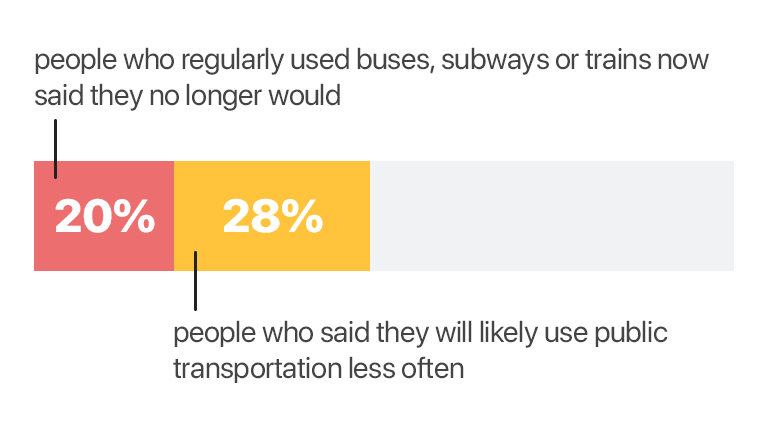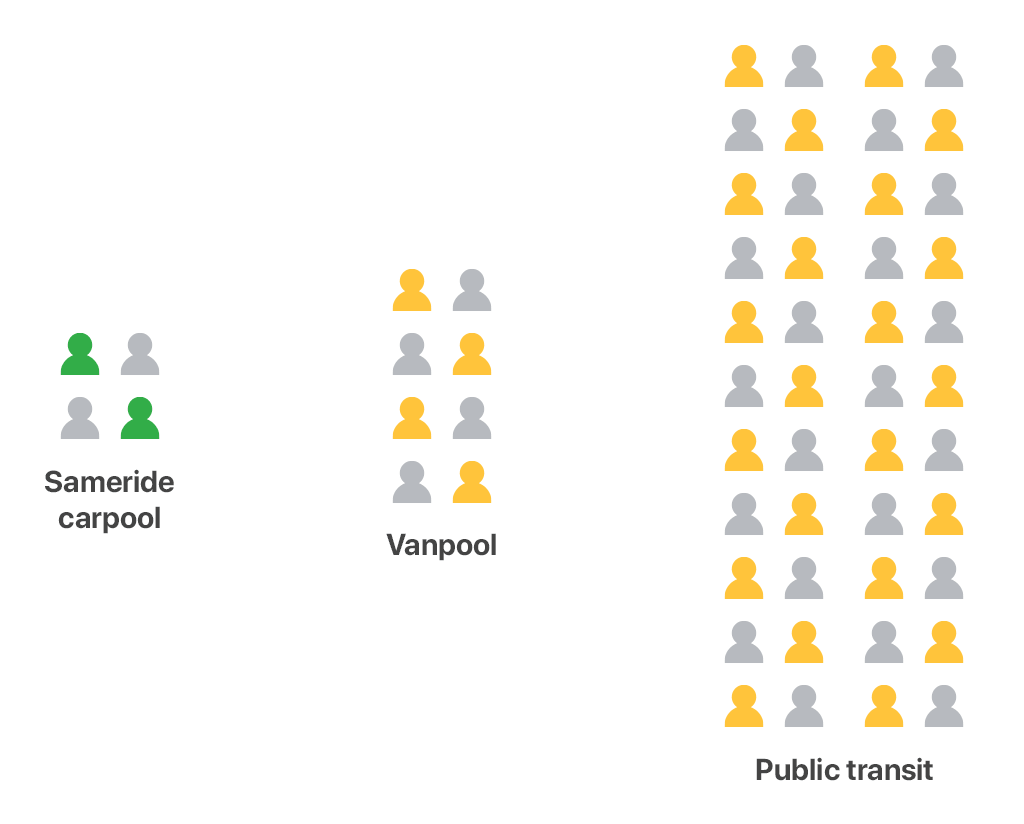Why carpool is a safe commute option
The businesses that are working now or plan to resume their work after governments ease lockdown measures and shelter-in-place restrictions understand that a lot of their employees havenʼt got their own cars. They have to use public transit packing dozens and hundreds to buses or trains. That presents an impossible situation when it comes to effective distancing.
Public transport is highly vulnerable to disease outbreaks such as the coronavirus pandemic.
A study by IBM shows people attitudes toward public transportation have shifted notably. More than 20 percent of respondents who regularly used buses, subways or trains now said they no longer would, and another 28 percent said they will likely use public transportation less often.
As lots of people are afraid to get sick and they move to cars, roads will be overwhelmed. Many experts say that “carmageddon” is coming. Traffic in large cities won’t simply snap back to pre-pandemic levels – instead, congestion may rapidly balloon to heights never seen before. Even at 50% of a full reopening of cities is perhaps 100% or more of automobile traffic.
Most individuals, cities, and businesses are facing a deep crisis amidst the pandemic and its consequences.
Companies should all be ready to defend themselves and change their behaviors for the foreseeable future.
Primarily they should pay much attention to transit needs of their employees helping maintain a smooth commute. Businesses are prioritizing employee safety and productivity, and want to have a larger role in minimizing the risk of infection among commuting staff. It is inseparably linked with efficient and unrestricted work of their employees.
Working remotely away from a crowded office is nice, but managers think people are more productive where they can be seen. A couple of big tech companies plan to allow it post-pandemically but some canceled it long ago. So, people will be recalled into offices and then cars will crowd the roads.
Many companies with large workforces are running awareness campaigns to help employees plan commutes better, encouraging a safe commute, like carpool, and even rewarding top carpoolers to keep employees engaged and motivated to reduce CO2 emissions and traffic congestions across cities.
Transportation options should meet the following requirements:
-
- safety (decreasing the risk of COVID-19 infection);
- ability of contact-tracing.
Commuters and employers ask many important questions such as:
-
- When I return to my workplace, should I use my previous mode of transportation? Is it safe?
- Is it possible to commute safe during COVID-19 global threat?
- How will I get to work if I haven’t got a car?
- If I have a car, will I be able to get to work? How can I avoid traffic congestions which are getting worse?
- Is carpool a safe commute option compared to other public transit modes?
- How does Sameride help me make commute safe and convenient?
- How can Sameride help employer organize reliable employee commute and improve business?
So, why is carpool a safe transportation option for your commute?
Lower risk of getting infected
Everybody knows that physical distancing helps reduce the risk of a virus being transmitted. The interiors of trains, buses, and stations are the perfect environment for a droplet-spread disease like COVID-19 to thrive. Masses of people congregate in those areas, increasing the risk of direct contact with an infected person. As the economy begins to reopen, physical distancing will soon be impossible on public transit vehicles (when ridership returns to 30% of normal levels).
Regarding carpool, it enables reducing passenger capacity to the minimum: just two people in a car. Unlike other commute modes it’s a great opportunity to limit the number of contacts you drive with.
During the pandemic Sameride recommends to limit number of people in a vehicle and increase distancing (driver in front, passenger in back right seat).
We recommend drivers to pay close attention to clean and disinfect vehicles as often as possible (armrests, locks, window buttons, seatbelts, exterior and interior door handles).
Using the app, commuters find rides easy, faster and on-demand, and book them remotely. If you commute with Sameride, you board a vehicle avoiding crowds and waiting.
Sameride enables joining rides thoughtfully and carefully, preselecting them and using previous commute experience.
To make carpooling far more safe carpoolers are able to restrict a list of passengers in vehicles to employees of one organization (colleagues) or even smaller groups of co-workers or team members, limiting contacts outside families and colleagues.
Community of trusted and responsible commuters
Sameride helps friends, neighbours and colleagues make better commute facilitating creation of socially responsible and active commuter communities and groups.
Safety is a shared responsibility. We are building a network of like-minded people to make commute safe, reliable, affordable and enjoyable, and deliver a long list of other benefits to our community members.
Why safe and smooth commute is critical for employers
Quarantine measures show us that commute and safety are not only employees’ issues, they become employer’s responsibility. Companies are investing to reduce time and cost of employee commuting, improving quality of life and productivity of their staff.
Sameride collaborates with businesses providing custom transportation programs and related effective steps that help companies organize safe, beneficial and reliable commute for their employees, and contribute a faster restoration of the normal functioning of business, overcome consequences of the recession.
Implementation of such transit programs makes companies more enduring, defend them from the second wave of coronavirus pandemic and, as a result, new lockdowns.
We develop community of employers engaging companies into the transportation groups to create shared services of fast, low-cost and safe commute for their employees.



0 Comments